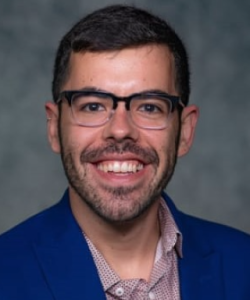Joshua DeSilva, PsyD, CGP

Joshua DeSilva, PsyD, CGP (they/them) guest presented in the AEDP Institute-sponsored seminar, “Wounds We Cannot See” in October, 2020 and currently serves on the AEDP Institute’s DBEI Committee. Joshua is a licensed psychologist in Virginia and DC. They identify as a nonbinary Latine person of queer experience. Their family immigrated from Venezuela and maintains strong ties to Latin America. Growing up in the Midwest as a first generation American and attending college and graduate school as a first generation student has powerfully impacted their sense of the importance (and difficulty) of empowering diverse groups to live and learn in spaces that have historically been oppressive and unwelcoming. Professionally, Dr. DeSilva (Josh) is the Associate Director and Director of Training at American University Counseling Center. Josh feels lucky to be a part of the future of psychology in this role. They were appointed by Governor Ralph Northam to serve as a Member of the Virginia Latino Advisory Board and currently serve as Vice Chair of the Board. Outside of training and community advocacy work, Josh’s private practice focuses on antiracist and identity-affirming care with LGBTQ+ clients, male-identified and nonbinary clients, BIPOC clients, and communities affected by chronic health conditions. Josh completed their pre-doctoral internship in psychology at Howard University Counseling Services in Washington, D.C., and they have completed the 2-year training program in group psychotherapy at the Washington School of Psychiatry. Their group and consulting work focuses on inclusion of historically marginalized voices and leadership development for leaders of color. Josh holds a Doctor of Psychology degree from George Washington University, is a Registrant in the National Register of Health Service Psychologists, and is a Certified Group Psychotherapist. They are passionate about using AEDP to understand identity, intersectionality, and how to heal from identity based wounds. Josh is very clear that the focus of therapy should be on liberation rather than on adjusting to oppression and sees experiential therapies as bridges to achieving that goal with clients.
